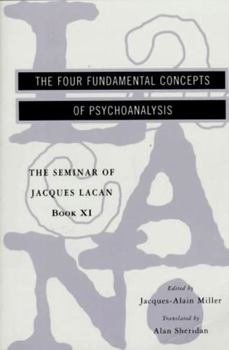The Seminar of Jacques Lacan: The Four Fundamental Concepts of Psychoanalysis
(Book #11 in the Le Séminaire Series)
Select Format
Select Condition 
Book Overview
This volume is based on a year's seminar in which Dr. Lacan addressed a larger, less specialized audience than ever before, among whom he could not assume familiarity with his work. For his listeners then, and for his readers now, he wanted to "introduce a certain coherence into the major concepts on which psycho-analysis is based," namely, the unconscious, repetition, the transference, and the drive. Along the way he argues for a structural affinity...
Format:Paperback
Language:English
ISBN:0393317757
ISBN13:9780393317756
Release Date:April 1998
Publisher:W. W. Norton & Company
Length:304 Pages
Weight:0.97 lbs.
Dimensions:0.8" x 5.8" x 9.3"
Customer Reviews
3 ratings
speech of the fathers
Published by Thriftbooks.com User , 15 years ago
this is jacques lacan's 11th seminar. he said this seminar had two aims, one of concern to analysts and the other to those interested in discovering whether psycho-analysis is a science. and before lacan began his talk about the four fundamental concepts of psycho-analysis, he thanked his hosts for space in the ecole normal superieure after his excommunication from the international psycho-analytical association, and paralleled his excommunication from the predominantly english speaking psycho-analytical organization with spinoza's excommunication from the church in 1656, exactly two hundred years before the birth of freud. in his opening remarks lacan informs his listeners that the word fundamental in latin, fundamentum, has several meanings, one of the word's meaning identified with the word pudendum. what better way to capture his listeners' attention? talk of female genitalia is expected to be as scandalous as once was knowledge of the holy scripture beyond the walls of the monastery, and left to the authorities, the church fathers, to disseminate exclusively from father to acolyte. so here with his 11th seminar lacan spoke of the four fundamental concepts of psycho-analysis, a topic intended for the acolyte and the layman within the psycho-analytical community, and, with his permission, his spoken words to be arranged as text to be published for any and all curious readers. rest assured, the guardians of the secrets know lacan's seminars are far less known than the bible, or perhaps, unfortunately, as popular as the works of spinoza within the walls of the university. attending lacan's first seminar at the ecole normal superieure is the 19 year old jacques-alain miller, the future editor of lacan's papers. several of miller's questions to lacan at the seminar appear in the text. in the 11th lacan took his 1st step, to the unconscious. and his 2nd step to the concept, repetition, freudian repetition, and the experience of psycho-analysis. he discussed trauma, the real, phantasy and the dream, and mentioned kierkegaard's `repetition'. inspired by merleau ponty's last book `the visible and the invisible,' lacan inserted between the 2nd and 3rd steps, an expiation of the scopic function and the gaze, optics, art, sartre, and descartes as scientist, mathematician and philosopher, before addressing the two remaining concepts, transference and drive. and by delineating differences and similaries in meaning and use of terminology and concepts, lacan explored, in addition to whether psycho-analysis is a science, the suggested question, if psycho-analysis might not also be an art form or a branch of philosophy, or a member of linguistics. as fun and as freewheeling as lacan seemed to be, he made clear what he was teaching was a grave undertaking.
The Master - but not for all!
Published by Thriftbooks.com User , 22 years ago
Lacan must be read with care. He is not for everybody. He is for those who are interested in the mind, in desire, in language. Specifically, for those who have developed an interest in "theory" or "post-structuralism", which he helped to develop. In this volume Lacan sets out some key concepts in his thinking - but he does not do so systematically! Do not expect him to explain everything to you in a clear, linear fashion. Rather, he plays on words and on ideas, he maneuvers and evades, he skirts around the issue, and comes back to it. Have patience if you choose to read him - discuss his writings with others. If you do this, you may come to understand why Lacan is regarded with so much respect in France and has virtualy reared an entire generation of first-rate theorists and thinkers.It will help (but will not guarantee understanding) if you have some background in Freud, even if it is only a slight one. Good luck!
No explanation needed. Lacan rocks my world.
Published by Thriftbooks.com User , 26 years ago
Most people who have read Lacan did so in an academic context, which can sour one's experience of truly useful texts. Yet I encourage those of you interested in learning more about psychoanalytic theory, and the way humans ARE in general, to pick up the Four Fun Concepts. Of course its content is difficult and subject to debate, but the benefits of reading Lacan, especially in conjunction with Freud (and even Irigaray, if need be) are immense. A MUST for artists, writers, historians, Psych students, feminist theorists, and anyone else who likes to learn and think.






